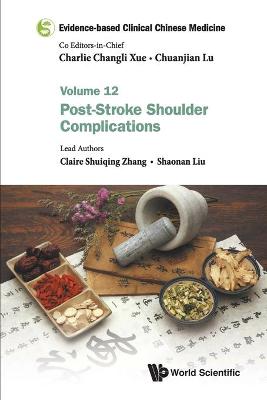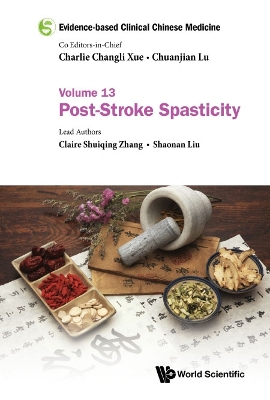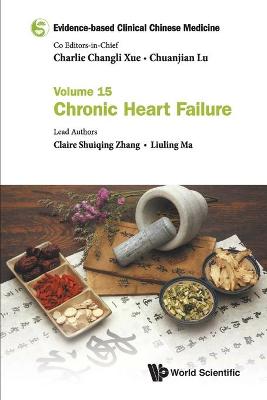Evidence-based Clinical Chinese Medicine
4 primary works
Book 12
Evidence-based Clinical Chinese Medicine - Volume 12: Post-stroke Shoulder Complications
by Claire Shuiqing Zhang and Shaonan Liu
Published 24 October 2019
The twelve volume in the Evidence-based Clinical Chinese Medicine series is a must read for Chinese medicine practitioners interested in neurology or rehabilitation. Using a 'whole evidence' approach, this book aims to provide an analysis of the management of post-stroke shoulder complications with Chinese and integrative medicine.This book describes the understanding and management of post-stroke shoulder complications with conventional medicine and Chinese medicine. Chinese medicine treatments used in past eras are analysed through data mining of classical Chinese medicine books. Several treatments are identified that are still used in contemporary clinical practice.Attention is then turned to evaluating the current state of evidence from clinical studies using an evidence-based medicine approach. Scientific techniques are employed to evaluate the results from studies of Chinese herbal medicine, acupuncture and other Chinese medicine therapies. The findings from these reviews are discussed in terms of the implications for clinical practice and research.Chinese medicine practitioners and students can use this book as a desktop reference to support clinical decision making. Having ready access to the current state of evidence for herbal formulas and acupuncture treatments allows practitioners to be confident in providing evidence-based health care. This book is an easy to use reference, thus allowing practitioners to focus on providing high quality care supported by the best available evidence.This book links formulas, herbs and acupuncture points with treatment efficacy, providing the reader with potential for creating new formulas. Several of the most frequently used herbs from randomized controlled trials were investigated to identify their pharmacological actions in animal and cell-line studies. This gives the reader insight into the potential actions of herbs and their chemical constituents that are relevant to the pathogenesis of post-stroke shoulder complications, and may provide leads for drug discovery.The editors of this series are internationally recognized, well-respected leaders in the field of Chinese medicine and evidence-based medicine with strong track records in research.
Book 13
Evidence-based Clinical Chinese Medicine - Volume 13: Post-stroke Spasticity
by Claire Shuiqing Zhang and Shaonan Liu
Published 6 August 2020
The thirteen volume in the Evidence-based Clinical Chinese Medicine series is a must read for Chinese medicine practitioners interested in neurology or rehabilitation. Using a 'whole evidence' approach, this book aims to provide an analysis of the management of post-stroke spasticity with Chinese and integrative medicine.This book describes the understanding and management of post-stroke spasticity with conventional medicine and Chinese medicine. Chinese medicine treatments used in past eras are analysed through data mining of classical Chinese medicine books. Several treatments are identified that are still used in contemporary clinical practice.Attention is then turned to evaluating the current state of evidence from clinical studies using an evidence-based medicine approach. Scientific techniques are employed to evaluate the results from studies of Chinese herbal medicine, acupuncture and other Chinese medicine therapies. The findings from these reviews are discussed in terms of the implications for clinical practice and research.Chinese medicine practitioners and students can use this book as a desktop reference to support clinical decision making. Having ready access to the current state of evidence for herbal formulas and acupuncture treatments allows practitioners to be confident in providing evidence-based health care.This book provides:With this information provided in an easy to use reference, practitioners can focus on giving high quality care supported by the best available evidence.
Book 15
Evidence-based Clinical Chinese Medicine - Volume 15: Chronic Heart Failure
by Claire Shuiqing Zhang and Liuling Ma
Published 4 August 2020
The fifteenth volume of the Evidence-based Clinical Chinese Medicine series examines the management of chronic heart failure with Chinese medicine using a 'whole evidence' approach. Readers are provided with an overview of the current management of chronic heart failure with both conventional medicine and contemporary Chinese medicine. This is followed by a detailed analysis of how chronic heart failure was viewed and managed in past eras.Evidence from clinical studies is systematically reviewed and analysed to evaluate the potential benefits of Chinese herbal medicines and other Chinese medicine treatments for people with chronic heart failure. A review of experimental studies highlights some of the mechanisms of actions of a selection of the most frequently used Chinese herbs. The outcomes of analyses are presented and discussed in the final chapter and we identify implications for contemporary practice and promising areas for future research.This book provides clinicians and students in the fields of Chinese and integrative medicine with a comprehensive synthesis of traditional and contemporary knowledge that can inform clinical decision-making.
Book 23
Evidence-based Clinical Chinese Medicine - Volume 23: Episodic Migraine
by Claire Shuiqing Zhang and Shaohua Lyu
Published 24 April 2021
This 23rd volume of the Evidence-based Clinical Chinese Medicine series aims to provide a multi-faceted 'whole evidence' analysis of the management of Episodic Migraine in integrative Chinese medicine.Beginning with overviews of how Episodic Migraine is conceptualized and managed in both conventional medicine and contemporary Chinese medicine, the authors then provide detailed analyses of how Episodic Migraine were treated with herbal medicine and acupuncture in past eras.In the subsequent chapters, the authors comprehensively review the current state of the clinical trial evidence for Chinese herbal medicines (Chapter 5), acupuncture and other Chinese medicine therapies (Chapter 7), and combination Chinese medicine therapies (Chapter 8) in the management of Episodic Migraine, as well as analyse and evaluate the results of these studies from an evidence-based medicine perspective. In Chapter 6, the authors review and summarize experimental evidence for the bioactivity of commonly used Chinese herbs in Chapter 6. The outcomes of these analyses are summarised and Chapter 1 Introduction to Migraine.This book can inform clinicians and students in the fields of integrative medicine and Chinese medicine regarding contemporary practice and the current evidence base for a range of Chinese medicine therapies used in the management of Episodic Migraine, including herbal formulas and acupuncture treatments, in order to assist clinicians in making evidence-based decisions in patient care.



